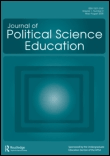
Journal of Political Science Education
Scope & Guideline
Bridging Theory and Practice in Political Science
Introduction
Aims and Scopes
- Innovative Teaching Methods:
The journal emphasizes the exploration of novel teaching strategies, including simulations, games, and experiential learning, to enhance student engagement and learning outcomes in political science. - Curricular Development and Assessment:
It addresses the design and assessment of political science curricula, aiming to improve educational practices and align them with contemporary educational standards and student needs. - Diversity and Inclusion in Political Science Education:
The journal highlights the importance of incorporating diverse perspectives and inclusive practices within political science education to foster a more equitable learning environment. - Research on Student Learning Outcomes:
The publication features studies that investigate the impact of various teaching approaches on student learning outcomes, providing evidence-based insights to inform pedagogical decisions. - Civic Engagement and Political Efficacy:
The journal explores the role of political science education in promoting civic engagement and enhancing students' political efficacy, preparing them for active participation in democratic processes.
Trending and Emerging
- Experiential Learning and Simulations:
There is a growing emphasis on experiential learning and the use of simulations as effective pedagogical tools that allow students to engage actively with political concepts and processes. - Digital Learning and Technology Integration:
The integration of technology in political science education is increasingly featured, with articles exploring online learning platforms, digital tools, and innovative uses of technology to enhance student engagement. - Civic Education and Political Awareness:
Recent publications emphasize the importance of civic education and political awareness, focusing on how political science education can foster informed and engaged citizens. - Interdisciplinary Approaches to Political Science:
There is a notable trend towards interdisciplinary approaches, encouraging the incorporation of insights from other fields, such as sociology, psychology, and economics, to enrich political science education. - Inclusive Pedagogy and Diversity:
The journal is increasingly focused on inclusive pedagogy, addressing the need for diverse perspectives in the curriculum and equitable teaching practices that cater to a broad spectrum of students.
Declining or Waning
- Traditional Lecture-Based Teaching:
There is a noticeable reduction in articles advocating for traditional lecture-based teaching methods, as the focus shifts towards more interactive and student-centered learning approaches. - Emphasis on Standardized Testing:
The journal has seen fewer discussions around standardized testing as a primary measure of student learning, indicating a move towards more holistic and formative assessment strategies. - Narrowly Focused Curriculum Designs:
There appears to be a declining interest in narrowly focused curriculum designs that do not integrate broader themes of civic engagement, diversity, and interdisciplinary approaches, reflecting a broader trend towards more comprehensive educational frameworks. - Passive Learning Techniques:
The publication is moving away from passive learning techniques, such as rote memorization, in favor of active learning strategies that encourage critical thinking and student participation. - Limited Use of Technology in Teaching:
There is a decline in articles centered on the limited use of technology in political science education, as educators increasingly recognize the value of digital tools and online platforms for enhancing learning experiences.
Similar Journals

GIST-Education and Learning Research Journal
Inspiring Change through Evidence-Based Learning StrategiesGIST-Education and Learning Research Journal, published by INST UNIV COLOMBO AMERICANA-UNICA, stands as a prominent vessel for the dissemination of scholarly research in the field of education and learning. Since its inception in 2007, this open access journal has championed the free exchange of knowledge, allowing researchers, educators, and students from around the globe to contribute to and benefit from the latest findings and practices in educational theory and methodology. With its commitment to enhancing educational practices and influencing policy through rigorous research, GIST-Education and Learning Research Journal invites submissions that explore innovative teaching strategies, learning technologies, educational psychology, and related fields. Its accessibility and dedication to quality research make it an invaluable resource for anyone invested in the improvement of educational outcomes.

Pegem Egitim ve Ogretim Dergisi
Connecting Ideas to Transform Educational LandscapesPegem Egitim ve Ogretim Dergisi is a prominent academic journal published by PEGEM AKAD YAYINCILIK EGITIM DANISMANLIK HIZMETLERI TIC LTD STI, specializing in the field of education. Based in Turkey, this journal offers a platform for scholarly discourse, catering to both emerging and established researchers in the educational domain. With its ISSN 2148-239X, the journal aims to provide insights into contemporary educational practices, pedagogical innovations, and research findings that influence teaching and learning. Although classified in the Q4 quartile of the education category as of 2022 and achieving a Scopus rank of 1178 out of 1469, it remains a valuable resource for practitioners and academics alike. The journal ceased Scopus coverage in 2023, yet it continues to be a relevant outlet for educational research in Turkey and beyond. While it operates under traditional access models, the potential for collaborative research and knowledge sharing makes it a noteworthy choice for those engaged in the evolving landscape of education.

Medical Science Educator
Advancing methodologies for a brighter medical education.Medical Science Educator, published by SpringerNature, is an esteemed journal committed to advancing the intersection of educational methodologies and medical science. With a significant impact in its field, this journal holds a Q2 ranking in both Education and Medicine (miscellaneous) categories as of 2023, reflecting its dedication to high-quality research and scholarly dialogue. Operating in a digital format, the journal uniquely facilitates access to pivotal studies from its inception in 2011 until 2024, fostering innovation in medical education. The latest rankings highlight its credibility, placing it at the 63rd percentile in Social Sciences - Education and the 56th percentile in Medicine - Medicine (miscellaneous) within Scopus. This platform serves as an invaluable resource for educators, researchers, and practitioners aiming to enhance teaching practices and shape the future of medical education.
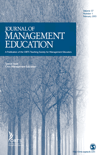
Journal of Management Education
Shaping Tomorrow’s Leaders in Management and EducationJournal of Management Education, published by SAGE Publications Inc, stands as a premier platform for disseminating high-quality research in the fields of management and education. With an ISSN of 1052-5629 and an e-ISSN of 1552-6658, this influential journal spans publications from 1975 to 2024, ensuring a comprehensive archive of scholarly work. Researchers and educators will find the journal particularly valuable, given its classification in the Q2 category for both Business, Management and Accounting and Education, reflecting its strong reputation and impact within these fields. With a Scopus ranking placing it in the 75th percentile for Education and 64th percentile for Business, the journal serves as an essential resource for those seeking to contribute to the advancement of management education. Although currently not an open-access journal, it offers researchers the chance to engage with critical insights that shape the pedagogical landscape in management. Situated in Thousand Oaks, California, the Journal of Management Education remains a pivotal reference for academia, practitioners, and students aiming to enhance their understanding of management practices and educational methodologies.
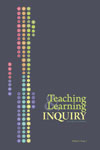
Teaching & Learning Inquiry-The ISSOTL Journal
Championing open access to transformative learning research.Teaching & Learning Inquiry-The ISSOTL Journal, published by UNIV CALGARY PRESS, is a premier open access journal dedicated to enhancing educational practices and fostering scholarly discourse in the field of teaching and learning. With an ISSN of 2167-4779 and E-ISSN 2167-4787, this journal has been at the forefront of educational research since its inception in 2013, operating within a converged timeframe until 2024. Recognized with a Q2 ranking in Education and classified within the 55th percentile of Scopus’ rankings for education-focused social sciences, the journal aims to disseminate original research, theoretical inquiries, and practical applications that contribute to the scholarship of teaching and learning (SoTL). As an open access publication since 2016, it ensures that vital research is widely accessible, making it a critical resource for researchers, educators, and students seeking to advance their understanding and practice in the dynamic landscape of education. Based in Calgary, Canada, the journal continues to engage with innovative perspectives that shape and define the educational experience, making it an essential read for anyone invested in the future of teaching and learning.
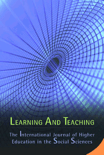
Learning and Teaching-The International Journal of Higher Education in the Social Sciences
Elevating Pedagogy for Tomorrow's Social ScientistsLearning and Teaching: The International Journal of Higher Education in the Social Sciences, published by BERGHAHN JOURNALS, stands at the forefront of interdisciplinary scholarship dedicated to enhancing the pedagogical landscape within the social sciences. With its Open Access model established in 2020, this journal provides a vital platform for disseminating innovative research and best practices that contribute to the evolving dynamics of higher education. Operating from the United States, and noted for its relevance in Developmental and Educational Psychology, Education, and Sociology and Political Science, Learning and Teaching has achieved commendable rankings, positing it in the Q3 and Q2 quartiles in several categories as of 2023. This recognition underscores its importance as a resource for researchers, educators, and students alike, fostering a robust dialogue about teaching strategies, learning environments, and educational theories. By converging research and practice from 2017 to 2024, Learning and Teaching is poised to influence the future of education, preparing scholarly contributors to address the complexities of learning in the social sciences effectively.

TEACHING OF PSYCHOLOGY
Enhancing Learning Journeys in the World of PsychologyTEACHING OF PSYCHOLOGY is a distinguished academic journal published by SAGE Publications Ltd, focusing on the field of psychology education. Established in 1975, this journal has carved out a vital niche in the academic landscape, facilitating the dissemination of innovative teaching practices, research outcomes, and pedagogical strategies that enhance the learning experience in psychology. With an impressive H-index indicating its influence, TEACHING OF PSYCHOLOGY is ranked in the second quartile for Education and third quartile for Psychology (Miscellaneous) in 2023, reflecting its pivotal role in these fields. The journal boasts a robust Scopus ranking, placing it within the 55th percentile for Social Sciences - Education and the 42nd percentile for General Psychology, demonstrating its relevance and reach among scholars and practitioners alike. Although it does not offer open access, it remains a crucial resource for educators, researchers, and students seeking to enhance their understanding and application of psychological principles in educational settings. By contributing to the ongoing dialogue about effective teaching methodologies in psychology, the journal aims to inspire and inform educators, fostering an environment of rigorous academic inquiry and practical application.
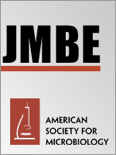
Journal of Microbiology & Biology Education
Fostering Innovation in Biological Sciences EducationJournal of Microbiology & Biology Education, published by the American Society for Microbiology, serves as a vital platform for advancing knowledge and education in microbiology and related biological fields. With an ISSN of 1935-7877 and an E-ISSN of 1935-7885, this open-access journal has been fostering scholarly communication since 2000, ensuring that vital research is accessible to a global audience. The journal covers a broad scope within the disciplines of Agricultural and Biological Sciences, Biochemistry, Genetics, Molecular Biology, and Educational methodologies, holding a significant position as reflected by its Q2 quartile rankings in multiple fields for 2023. The Scopus ranking highlights its relevance, ranking it in the 64th percentile in general Agricultural and Biological Sciences and Education, and 48th in Immunology and Microbiology. Positioned in the United States, the journal addresses the imperative need for educational resources and research dissemination in the ever-evolving landscape of microbiological sciences. Researchers, professionals, and students will find invaluable insights and pedagogical innovations within its pages, advancing both academic inquiry and educational practice.

Aula de Encuentro
Championing open access to elevate educational research.Aula de Encuentro is an esteemed academic journal dedicated to advancing knowledge in the field of educational sciences. Published by UNIV JAEN, ESCUELA UNIV MAGISTERIO SAGRADA FAMILIA, this journal has been an Open Access resource since 2013, promoting the dissemination of high-quality research and facilitating global access to scholarly work. The journal focuses on diverse aspects of education, including pedagogical practices, educational theory, and the role of education in societal development. With a commitment to fostering academic dialogue and collaboration, Aula de Encuentro provides a platform for researchers, professionals, and students aiming to contribute to educational innovation and improvement. With its growing reputation and open access model, the journal serves as a vital resource for those looking to stay at the forefront of educational research and practice.
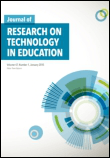
Journal of Research on Technology in Education
Empowering Educators through Technology-Driven Research.The Journal of Research on Technology in Education is a premier academic publication dedicated to exploring the intersection of technology and education. Published by ROUTLEDGE JOURNALS, TAYLOR & FRANCIS LTD, this journal stands at the forefront of educational research, boasting impressive Q1 rankings in both Computer Science Applications and Education for 2023. With an ISSN of 1539-1523 and an E-ISSN of 1945-0818, it is recognized in the Scopus database, ranking 31st out of 1543 in the field of Education, placing it in the 98th percentile, and 73rd out of 817 in the domain of Computer Science Applications, within the 91st percentile. The journal is committed to publishing high-quality research that informs practice and policy, with a scope that covers innovative uses of technology in educational settings from its inception in 2001 through 2024 and beyond. It is an essential resource for researchers, educators, and policymakers looking to harness the potential of technology in enhancing teaching and learning experiences.